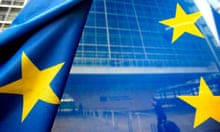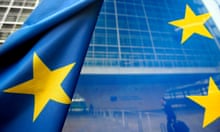The 2012 Nobel peace prize has been awarded to the European Union, with the Norwegian committee ignoring the current economic crisis and instead praising the EU's decades-long historical role in promoting reconciliation and peace.
Speaking in Oslo, Thorbjørn Jagland, head of the Nobel committee, shrugged off the euro's woes and said the EU had been a force for peace both after the second world war, binding Germany and France together, and following the bloody slaughter of the 1990s in the Balkans.
He said: "The main message is that we need to keep in mind what we have achieved on this continent, and not let the continent go into disintegration again." The collapse of the EU could lead to a resurgence of the "extremism and nationalism" that had led to so many "awful wars", he warned bluntly.
Jagland cited several key EU achievements. He said another conflict between France and Germany was "unthinkable" following 70 years as close allies. He mentioned the EU's successful expansion, with the accession of Greece, Portugal and Spain to the EU in the 1980s spreading democracy, and the admission of eastern European nations after the fall of the Berlin Wall.
He also praised the EU's role in the Balkans. "Ethnically based national conflicts have been settled," he declared. Croatia will join the EU next year, Montenegro was opening up membership negotiations and Serbia has candidate status, he said. The EU had also "advanced democracy and human rights" in Turkey, he suggested, overlooking the fact that Turkey's membership application has dragged on inconclusively for decades.
Jagland conceded that the 27-member bloc was not in great shape, saying: "The EU is currently undergoing grave economic difficulties and considerable social unrest." But he stressed: "The Norwegian Nobel committee wishes to focus on what it sees as the EU's most important result: the successful struggle for peace and reconciliation and for democracy and human rights. The stabilising part played by the EU has helped to transform most of Europe from a continent of war to a continent of peace."
Reaction to the news was sharply divided. Within minutes of the award being announced in Oslo at 10am GMT on Friday, the president of the European commission, Jose Manuel Barroso, tweeted: "It is a great honour for the whole of the #EU, all 500 million citizens, to be awarded the 2012 #Nobel Peace prize." He later called it a "justified recognition" of a unique project that works for the benefit of its citizens and the world.
But the award provoked derision from British Eurosceptics and some rightwing Tory MPs. Nigel Farage, the leader of Ukip, allegedly remarked: "This goes to show the Norwegians really do have a sense of humour." Another Ukip MEP, Marta Andreasen, said: "If this is their definition of peace then the Norwegians need a new dictionary."
Taking questions from reporters, Jagland defended the committee's seemingly counterintuitive decision and spoke repeatedly of the wars in former Yugoslavia: "We have to keep in mind that not so many years ago people from this part of Europe killed each other in awful wars … We are only focusing on what we have achieved on this continent and what could happen if disintegration starts again."
Jagland said the committee, made up of members from non-EU Norway, wasn't trying "to save the euro" or attempting to dig Europe out of its current hole. Asked what citizens from Greece, Spain and Ireland would make of their unanimous decision, he said a majority of citizens from these countries still supported the EU: "I think this historic empathy still remains in the heads of so many Europeans. They don't want to lose what has been achieved. Many may criticise the current policy but that is a different matter."
It is not clear who will actually pick up the award, to be presented in Oslo on 10 December. Jagland said it was up to "EU institutions" to decide which individual would pick up the gold medal and give a lecture at the presentation ceremony. One obvious candidate is the former German chancellor Helmut Kohl, though he is in poor health.


Comments (…)
Sign in or create your Guardian account to join the discussion